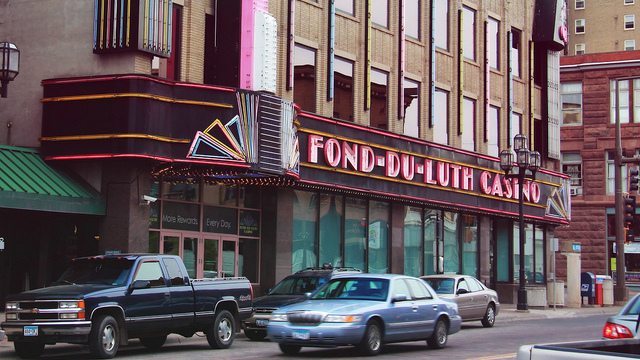
Today’s casinos of flashing lights and slot machines in smoke-filled rooms attract high rollers and bad losers. Many see casinos as a lucrative business for Native American reservations — but does this myth of money-making match reality?
Twenty-five percent of the U.S. population aged 21 and over visited a casino and participated in gambling in 2010. In that year alone, U.S. casinos enjoyed revenues of $34.6 billion, according to the American Gaming Association.
It’s a common assumption that the gaming industry is a cash cow for Native Americans, especially since the U.S. Supreme Court ruled in 1976 that as part of tribal sovereignty, state tax and regulatory laws do not necessarily apply to Native Americans living on reservations.
Tribal sovereignty refers to tribes’ right to govern themselves, define their own membership, manage property, and regulate tribal business and relations while recognizing a government-to-government relationship with states and the federal government. But despite tribes’ independence and exemptions, the Native American population as a whole comprises the minority living with the largest disparities in health, education and income in the United States.
The unemployment rate on some reservations can reach as high as 75 percent, with nearly 10 percent of all Native families being homeless. For some of those families who do have homes, they may lack electricity or running water, Liberation news reports.
Gaming has helped raise tribal communities out of poverty by providing funds for housing, schools, health care and education, as well as stable jobs for community members, but according to the Native American Rights Fund, of the estimated 560 federally recognized American Indian nations, only 224 are involved in gaming. Tribes who are geographically located on rural, unpopulated land may never take part in the industry, while those who reside near major urban areas benefit the most from gaming operations.
Can tribal sovereignty exist within a city?
The Fond du Lac Band of Lake Superior Chippewa not only has a casino on its reservation in northern Minnesota, but one that is located 20 miles to the east in downtown Duluth. With the “Fond-du-Luth” casino establishment located outside of the reservation, issues pertaining to tribal sovereignty and gaming revenues are currently being disputed by city leaders.
The Minneapolis Star Tribune reports that because Fond-du-Luth is outside the reservation, a 1994 agreement was enacted, stating that the casino would pay a 19 percent “rent” of its gross income for 25 years and an unspecified rate for the following 25 years to the city in exchange for services. This provided Duluth with around $6 million income annually from the Fond du Lac band, but in 2009, the band stopped paying.
Karen Diver, chairwoman of the Fond du Lac band, said payments were halted when it began questioning the legality of the agreement. After asking the National Indian Gaming Commission to review the 1994 consent agreement, it found the agreement violated the Indian Gaming Regulatory Act, which requires tribes to have “sole proprietary interest” for tribal casinos.
The band negotiated a payment-per-services model, covering services like law enforcement and fire protection, but a U.S. District Court judge ruled this month that $10.4 million is owed from the Fond du Lac band’s halted payments from 2009 to 2011, which the band might be able to appeal.
The issues that arose in Duluth were similar to those when New York Gov. Andrew Cuomo (D) was onboard for a plan to build casinos under the Seneca Nation in Rochester and other areas upstate.
Initially, like Fond-du-Luth, there was discussion of the state government receiving a negotiated piece of the casino’s gross intake, but the sovereignty issue again posed question.
“How could you put a sovereign nation in the middle of your downtown?” said Lovely Warren, Rochester city council president.
Steve Siegel, formerly of the College of Hospitality and Tourism Management at Niagara University, told Rochester City Newspaper that most of the time, when a tax-exempt casino is placed on what is claimed to be sovereign land within an urban setting, all of the gain goes to the casino complex.
“Local businesses are devastated because they can’t compete with this massive nontaxable entity,” Siegel said.
Native Americans are still Americans
Although the casino institutions themselves are not federally taxed, in 2006 the IRS issued a bulletin stating that individual Native Americans, especially those living outside of a reservation, are still subject to federal income tax every year.
More than seven in ten Native Americans and Alaska Natives now live in metropolitan areas, and 27 percent live in poverty, according to the Census Bureau.
The bulletin states:
“While there are numerous valid treaties between various Federally Recognized Indian Tribal Governments and the United States government, some of which may contain language providing for narrowly defined tax exemptions, these treaties have limited application to specific tribes … Taxpayers who are affected by such treaty language must be a member of a particular tribe having a treaty and must cite that specific treaty in claiming any exemption. There is no general treaty that is applicable to all Native Americans.”
Even so, many Native American families subject to treaties are still not exempt from taxes. The IGRA has provisions that permit tribes to make per-capita distributions from gaming activities to tribe members and the community. But according to the bulletin, “Under the Indian Gaming Regulatory Act, any distribution of casino gaming proceeds to individual tribe members is also subject to federal income tax.”
Essentially, Native Americans are living in a nation where the majority of its population is struggling to make ends meet. They face taxes and economic strife while trying to support their families. Some may sit more comfortably than others, but the late-night hours from visitors at the slot machines or blackjack tables don’t quite live up to the dream.


